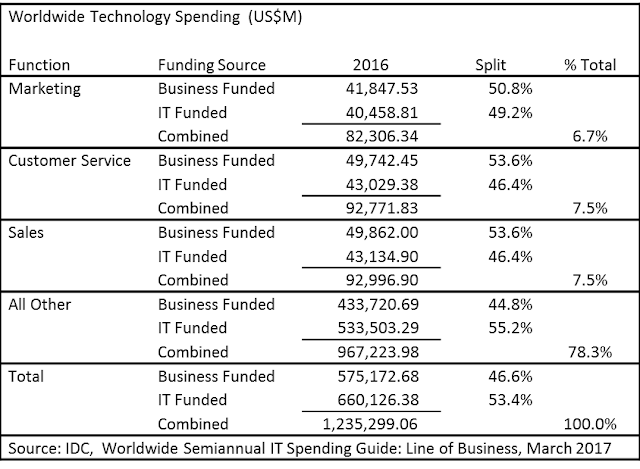Like many people in the marketing technology industry, I was tickled in 2011 when Gartner predicted that CMOs would soon have bigger tech budgets than CIOs, and even more tickled when Gartner said in 2016 that it had happened. But my recent pondering of the relationship of marketing and IT departments had me rethinking the question. On an anecdotal level, I’ve never seen or heard of a company where the marketing technology group was anywhere near the size of the IT department. And from a revenue perspective, there’s no way that marketing technology companies make up half the total revenue of the software industry.
But just as I was working myself up for some back-of-the-envelope calculations, the good people at International Data Corporation (IDC) announced a report with authoritative figures on the topic. Actually, the study estimates spending on 20 technologies and 12 corporate functional areas across 16 enterprise industries in eight regions and 53 countries, comparing the amounts funded by IT departments and by business departments. They haven’t published the figures for marketing in particular but did graciously provide them to me with permission to reprint them here. Without further ado, they are:
As you see, marketing technology expenses for 2016 are estimated at $82.3 billion, which is just 6.7% of the $1,235.3 billion for all categories. Slightly more than half of the marketing spend is business-funded, which presumably means it’s spent by CMOs. But that wasn't what Gartner had in mind: they were definitely comparing corporate IT budgets against marketing IT budgets.
I understand Gartner's logic but I find the IDC figures more plausible. One reference point is the known revenues of martech vendors. Adobe, which may well be the largest, just reported $1.6 billion in 2016 revenue for its marketing cloud (apparently including analytics and advertising products). Even if there are ten other vendors as large as Adobe, the top ten would have just a 20% share of the $82 billion. It’s hard to imagine the market is really that fragmented, even allowing for expenses that are unrelated to software.
Another reason I prefer the IDC figures is that surveys consistently show that marketing technology is far down the priority list of IT managers. That wouldn’t be the case if martech spend were equal to all other tech spending combined. Indeed, one of the main reasons that marketers have been eager to take control of their technology has been the neglect, benign or otherwise, shown by corporate IT.
So let's assume the IDC figures are much closer to correct. Does it matter? I'd answer it does because understanding the real relationship between martech and other systems is important. Marketers need to recognize that their systems are a small part of a big picture and can’t work independently of the rest of the company. Yes, marketers should control their internal systems. But the IDC figures show that sales and customer service spend more on tech than marketing. So, when it comes to customer-facing systems, marketers shouldn’t expect other departments to simply adopt marketing systems as a new core.
More likely, all departments will need to coordinate their existing systems with a shared, enterprise-level resource. This suggests that the common core / edge model of marketing systems needs to modified to distinguish an enterprise-wide core from a marketing department core. In some ways, this isn't a huge change because marketers have always co-existed with enterprise-core systems such as human resources and accounting. But marketers are much more likely to want control of customer-related systems like the Web site and Customer Data Platform. In this model, those are also part of the enterprise core.
Of course, having enterprise core systems leads right back to having the IT department manage those systems and ensure that departmental systems are compatible. IT departments are not necessarily eager to take this on. They have their hands full with things like security, cloud migration, and digital transformation. Nor are enterprise IT teams usually experts at the finer points of customer data management. They’ll certainly need help from marketing and other customer-facing tech teams. But, ultimately, managing the customer experience is a job for the whole enterprise, and enterprise IT is the logical team to manage enterprise-wide technology.
Wednesday, March 29, 2017
Subscribe to:
Post Comments (Atom)



3 comments:
David,
Does this mean MarTech vendors should split their outreach efforts between Marketing and IT?
Yes. IT is always an influencer even when Marketing controls the budget.
Great post David. I have linked your thoughts in a post that I wrote where I call out that in order to not misuse the Martech that we are arming our Marketers with-it is critical to re structure the Marketing department! http://www.hansacequity.com/ajayblog/index.php/2017/07/31/cmos-need-new-kind-team/
Post a Comment